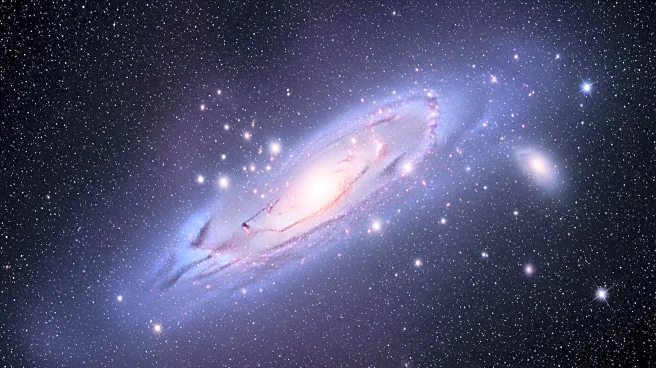What's Happening?
Recent discussions in the astrophysics community have centered around the nature of dark energy, with new evidence suggesting it may not be a constant as previously thought. Historically, dark energy was considered a cosmological constant, a form of energy inherent to space itself, which was revived in the 1990s following observations of the universe's accelerating expansion. However, recent data from various sources, including supernovae, cosmic microwave background (CMB), and large-scale structure measurements, have shown discrepancies that suggest dark energy might be evolving over time. This has led to debates among scientists, with some supporting the idea of dynamic dark energy, while others remain skeptical, preferring the traditional cosmological constant model.
Why It's Important?
The nature of dark energy is crucial to understanding the universe's expansion and its ultimate fate. If dark energy is indeed evolving, it could significantly alter current cosmological models and theories about the universe's future. This has implications for astrophysics and cosmology, potentially affecting how scientists interpret data from cosmic observations and the development of new theories. The debate also highlights the challenges in reconciling different types of astronomical data, which could lead to advancements in measurement techniques and a deeper understanding of cosmic phenomena.
What's Next?
The scientific community is awaiting more precise data from upcoming missions such as ESA's Euclid, NASA's SPHEREx, and the Vera C. Rubin Observatory. These missions are expected to provide superior data that could clarify the nature of dark energy and resolve existing tensions in current measurements. As new data becomes available, scientists will continue to test the hypothesis of evolving dark energy and explore alternative explanations for the observed discrepancies. The outcome of these investigations could lead to significant shifts in cosmological theories and our understanding of the universe.
Beyond the Headlines
The debate over dark energy's nature also touches on broader scientific issues, such as the reliability of data interpretation and the potential for unknown errors in measurements. It raises questions about the assumptions underlying current cosmological models and the need for caution in drawing conclusions from complex data sets. The discussion reflects the dynamic nature of scientific inquiry, where new evidence can challenge established theories and lead to paradigm shifts.









